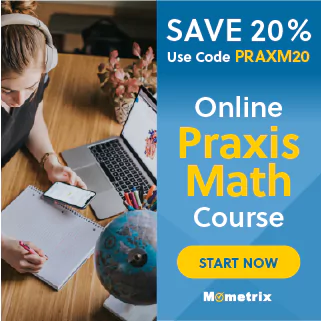The Praxis Mathematics: Content Knowledge (5165) Exam is designed to evaluate the readiness to teach secondary school math.
This computer-delivered exam is 2.5 hours in length, and includes 60 selected-response, numeric entry, drag-and-drop, text completion, and other questions. There may be some questions included that do not count toward your score.
An on-screen graphing calculator will be provided, so you are not allowed to bring your own.
Remember, your score is based on the number of questions you get correct. There will be no penalty for questions answered incorrectly.
For individuals with conditions that meet the Americans with Disabilities Act requirements, there are accommodations available.
Some of these testing accommodations include extended testing time, additional beaks, separate testing room, writer/recorder of answers, test reader, Perkins Brailler, Braille slate and stylus, oral interpreter, audio test, Braille test, and large print test book and answer sheet.
Online Praxis Mathematics (5165) Prep Course
If you want to be fully prepared, Mometrix offers an online Praxis Math Prep Course. The course is designed to provide you with any and every resource you might want while studying. The Praxis Mathematics (5165) Course includes:
- Review Lessons Covering Every Topic
- 500+ Praxis Math Practice Questions
- More than 400 Digital Flashcards
- Over 220 Instructional Videos
- Money-back Guarantee
- Free Mobile Access
- and More!
The Praxis Mathematics (5165) Prep Course is designed to help any learner get everything they need to prepare for their Praxis Math exam. Click below to check it out!
What are the categories, topics, and sub-topics covered on this exam?
There are 2 areas that will be assessed on this exam. The areas are:
- Number and Quantity, Algebra, Functions, and Calculus – 68%
- Geometry, Probability and Statistics, and Discrete Mathematics – 32%
Number and Quantity, Algebra, Functions, and Calculus
Some of the topics that will be evaluated under Number and Quantity include properties of exponents, properties of rational and irrational numbers, using quantitative reasoning to solve problems, natural, integer, rational, real, and complex numbers, using matrices to perform operations, measurements, and estimations.
Some of the topics that will be evaluated under Algebra include writing algebraic expressions, arithmetic operations and polynomials, zeroes and polynomial functions, polynomial identities, rational expressions, equations and inequalities, using reasoning to solve problems, properties of number systems, and line and slope as a rate of change.
Some of the topics that will be evaluated under Functions include function notation, domain and range of a function, analysis of function behavior, how functions and relations model the relationships between quantities, how new functions are gotten from existing functions, identifying and comprehending the differences between linear, quadratic, and exponential models, trigonometric identities, and solving trigonometric, logarithmic, and exponential equations.
Some of the topics that will be evaluated under Calculus include calculating limits of functions, derivative of a function (limit, slope of line tangent to curve, and rate of change), continuity and differentiability, approximating derivatives and integrals, applying derivatives, theorems of calculus, Riemann sums, limits of sequences, and simple infinite series.
Geometry, Probability and Statistics, and Discrete Mathematics
Some of the topics that will be evaluated under Geometry include transformations in a plane, proving geometric theorems, trigonometric ratios in right triangles, trigonometry and general triangles, theorems and circles, utilizing coordinate geometry, perimeter, area, surface area, and volume formulas, and using geometry in real-life.
Some of the topics that will be evaluated under Probability and Statistics include summarizing, representing, and interpreting data, comprehending statistical processes, making inferences, computing probabilities, making informed decisions, and finding probabilities.
Some of the topics that will be evaluated under Discrete Mathematics include comprehending sequences, understanding equivalence relations, knowing the differences between discrete and continuous representations, terms and symbols of logic, and set theory.
What is the most convenient way to register for the exam?
The easiest way to register for this exam is online. You can make your payment via credit and debit card or PayPal. After registering, you will receive an admission ticket for test day.
Although not as convenient, you may also register via mail or over the phone.
What is the cost of the exam?
The cost of the Praxis Mathematics: Content Knowledge Exam is $120. Examinees taking the exam in Nevada will be charged a $5 surcharge.
What are the testing dates and locations?
At various testing sites, this exam is offered continuously, throughout the year.
What should I do the day of the exam?
Arrive early (approximately 30 minutes) so you have time to go through the check-in process. Be sure to have your admission ticket and form of identification that consists of your name, signature, and photo.
A passport, passport card, driver’s license, national identification, and military identification card are examples of acceptable identification.
Personal items such as a cell phone, calculator, handbag, briefcase, purse, water bottle, and study materials are prohibited from the testing area.
What happens after I take the exam?
You will receive an unofficial test report on the screen immediately after completing the exam. Around 10-16 business days after taking the exam, your official score report will be available.
What happens if I don’t pass the exam?
You can re-take the exam once every 21 days.
How Can I Prepare for the Praxis Mathematics Test?
We believe that different learning styles require different tools for success. We have compiled a list of the best study guides, flashcards, and practice tests that we’ve found on the market. Some of these guides have review videos, for you visual learners out there. Others have practice tests, which have been proven to increase student scores by a whole letter grade (in some cases more than that)!
Top Study Guides:
Best Flashcards:

